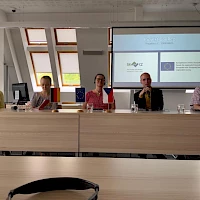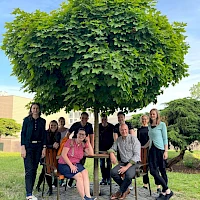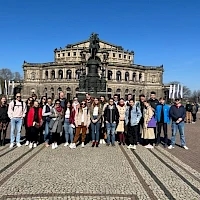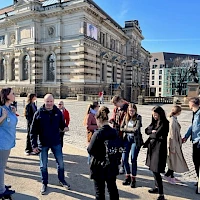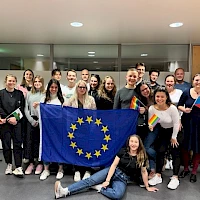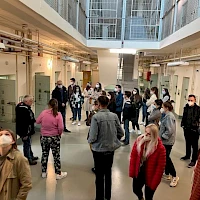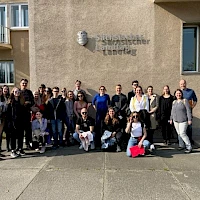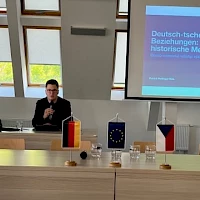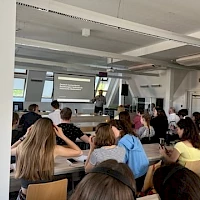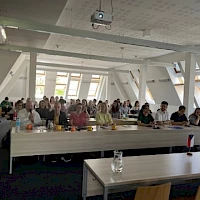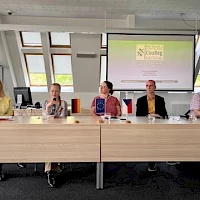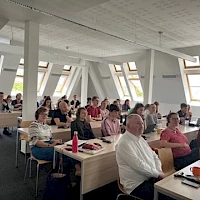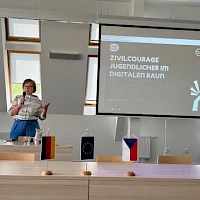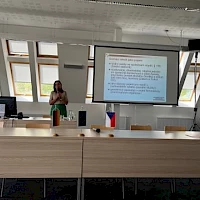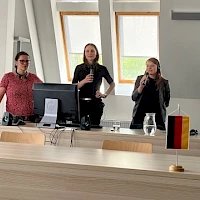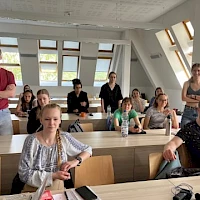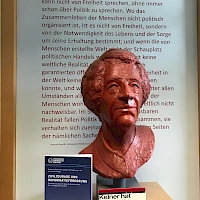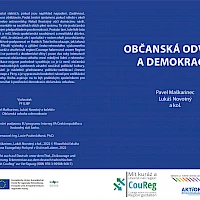COUREG - Have courage and shape our region
Project partners
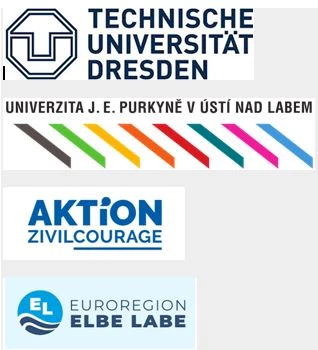
As part of the CouReg project, the long-standing cooperation between the TU Dresden and the Univerzita JE Purkyné Usti nad Labem in the Department of Political Science is being strengthened.
All scientific activities are jointly coordinated by the universities. The TU Dresden assumes the role of lead partner.
For the practical implementation, we will work together with the Aktion Bürgercourage eV in Pirna, an established provider of political education and democratic youth work in the Saxon Switzerland region, which already carries out a wide range of educational offers in cooperation with schools.
In the Czech Republic, the office of the Euroregion Elbe/Labe acts as a partner for contacts to communities where students can carry out their research. The program parts of the intercultural exchange are also coordinated here.
project setup
1) Four workshops for students
The aim of the workshops is to improve cooperation between the TU Dresden and the UJEP in Ústí nad Labem. This includes cross-border cooperation, joint learning of young Germans and Czechs and interpersonal encounters. The students gain new knowledge about democratic culture and intercultural skills. The bilingual workshops will deal with the following topics: theory and practice of civil courage, democratic culture, social tension in the border areas, the problem of right-wing extremism and practical exercises.
2) Educational module for students
A total of 10 intercultural educational programs for schools in the border areas are being carried out. In Saxony, four secondary schools in the Elbe Euroregion are taking part (2x Pirna, Dohna, Sebnitz). There is also the Vogtland Vocational School Center and the Schiller High School in Pirna. In the Czech Republic it will go to four schools/základní školy in the area of the Euroregion Elbe (Ústí nad Labem, Tisá, Dubí, Chlumec). The educational program consists of 90 minutes of teaching and simulations and is carried out by the German-Czech project team (with the cooperation of all partners, students from the two universities and the local teachers).
In order to increase the chances that young people show civil courage, theoretical knowledge is taken up in this educational module and processed and trained in practical exercises. Participants are invited to reflect on their own attitudes and values in the form of sociometric constellations and discussions. Furthermore, one's own body perception and effect is practiced through (non-)verbal exercises in pairs or with the entire group, in particular on setting boundaries and role-typical appearances and effects (including status theater on perpetrators, victims, observers). The focus is on exemplary learning based on concrete civil courage situations in role-playing games, example videos and digital civil courage games to train behavior and action in critical situations. The planned results of these school projects are also that democratic potentials are discussed and made visible, new knowledge and intercultural skills are imparted.
Both formats create new opportunities for intercultural dialogue and cultural identification for young people between the ages of 14 and 25 in a structurally weak region.
3) Didactic materials for teaching civil courage
Our educational module on moral courage and the commitment of young people to civil society is also published on the project website with didactic teaching materials in German and Czech for other schools. There is a need for these (digital) offers - our project wants to close this gap.
4) Outcomes for general public & science
All findings are prepared by the students and the project partners for the general public. This happens on the one hand in the form of this website, which tells our stories about courage and democracy, and on the other hand in the form of a textbook on political education, which is made available as a guide for didactics of political education work. The political science implications of the CouReg project are analyzed by the two universities and published for the specialist public.
The findings on the ideas of young people are also interesting for political leaders, because they provide information about positive examples of courageous and democratic action as well as people's ideas regarding the development of the border region.
Project activities
On April 19, 2021, the first of three joint university seminars of Univerzita JE Purkyně and TU Dresden took place. Under the title "Democratic Values in the Czech Republic and Germany", the 33 students first received an introduction to the normative foundations of the political systems of both countries. The German-Czech student teams then worked together in various workshops on individual basic values of democracies. They exchanged views on current challenges in both countries and considered what politics and civil society must do to meet the challenges of promoting democracy, environmental protection and governance in a multi-level system.
For example, the influence of Russia on the politics of both countries was discussed, political extremism and populism, the role of the European Union, but also very personal experiences with Erasmus programs, daily shopping from the perspective of sustainability or the availability of vaccinations in the current corona pandemic.
On May 3rd, 2021, the second university workshop on the topic "Courageousness - Participation - Social Commitment" followed. After a theoretical introduction to the concept, the focus was on the fact that more and more initiatives, awards, campaigns and training programs to promote civil courage have emerged in recent years. At the same time, attacks, violence and discrimination keep frightening us. Reason enough to question what constitutes civil courage, how we can promote it and what role citizens' experiences of self-efficacy can play in a democracy. Are there ways to give more people the courage to be courageous by improving citizen participation and promoting voluntary commitment?
"Introduction to educational work" was the motto of the third workshop on May 17, 2021. Among the three questions:
- Training to become a peer teamer – how does that work?
- Political education at school – what am I allowed to do?
- Structure of an online seminar - how do I do it?
we took a look at the practice of political education work. We discussed very intensively where the limits of political education for civil courage must lie and how instructors and teachers should behave in difficult situations according to the principles of the Beutelsbach consensus. It also became interactive and we tested various digital tools and small games that can enhance online seminars. Under the ZIM formula, we discussed how a workshop offer in schools should be planned. This gave all participants a foretaste of the in-depth session, which then deals with the concrete planning of the school projects that our students will carry out in schools.
On May 31, 2021 we will conclude our series of online seminars on the topic "Practical promotion of moral courage". Then it will be "Doing is like wanting, only blatant!". Because incidents of exclusion, threats and discrimination are part of our everyday life. But only a few take a look or even intervene - often only with good intentions. Courageously standing up for others and acting with civil courage can be trained, however, and heroic deeds are by no means required to counteract injustice effectively! In the last German-Czech university workshop, employees show us of the Pirnaer association Aktion Bürgercourage e.
5) On November 19-21, 2021, a workshop for students from the TU Dresden and UJEP took place
Program:
13:15 Arrival
16:00 Opening of the workshop Welcome by the mayor of Tisá Tomáš Kratochvíl
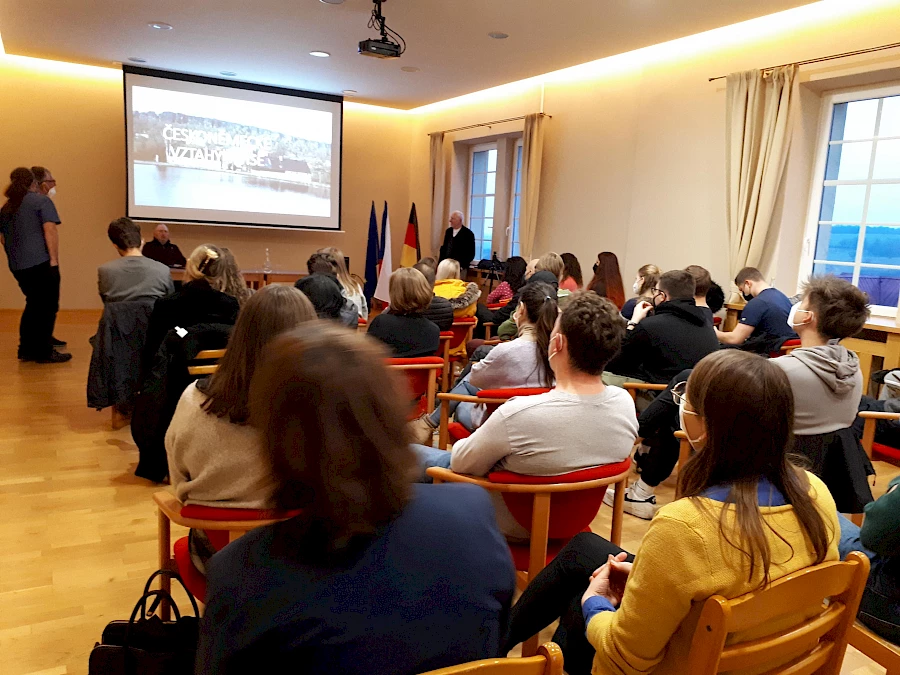
16:15 - Presentation of the history of Czech-German coexistence in the border region 1920-1946 with District Governor Jiří Řehák, supported by KPF EEL, Interreg VA ČR-Saxony
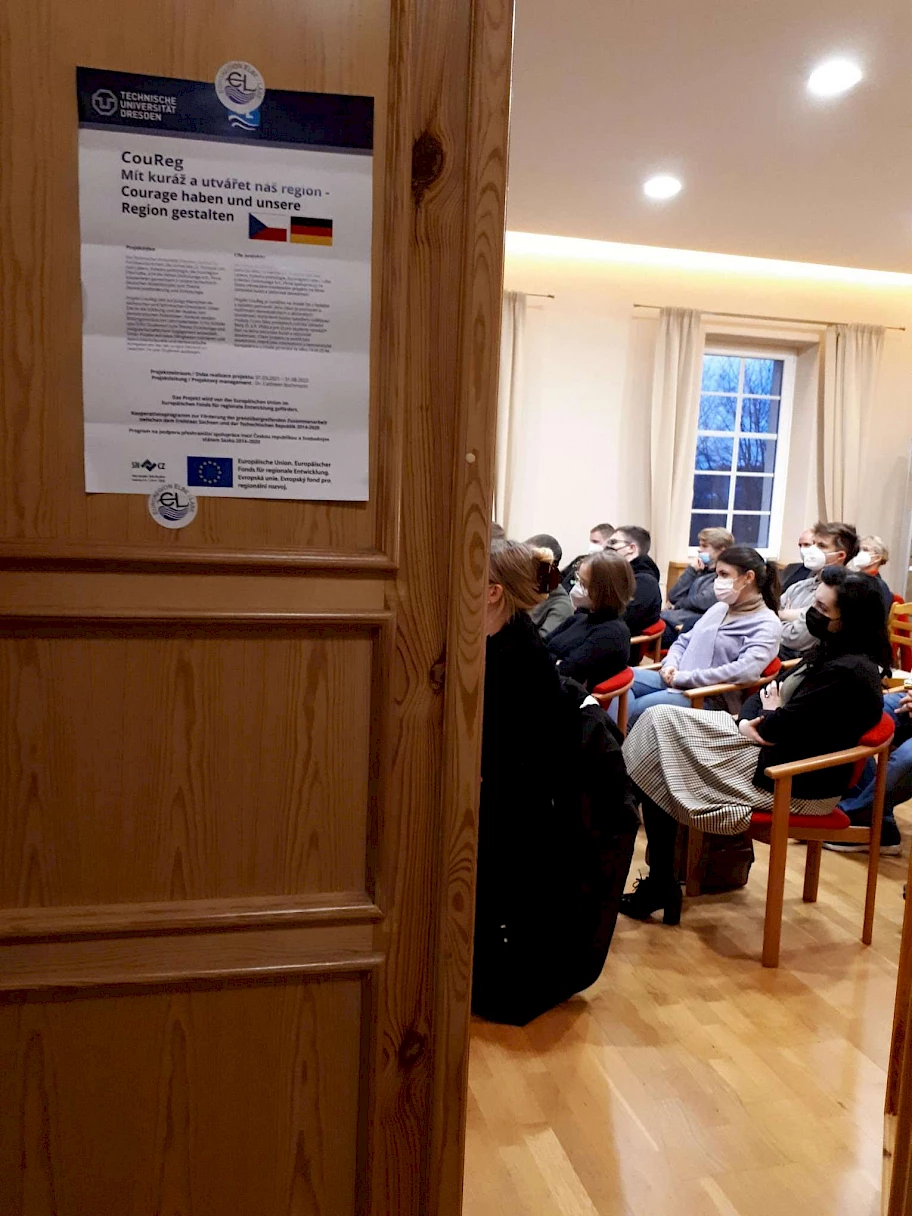
17:00 - Discussion
17:30 - Coffee break
18:00 - Introduction: Democratic values and their challenges
19:30 - departure to Ústí nad Labem
On Saturday, November 20th, 2021 (UJEP)
9:00 Civic engagement and cross-border cooperation - Vladimír Lipský, Lukáš Novotný
9:45 Democracy in CZE and elections 2021 Jan Švestka, Pavel Maškarinec 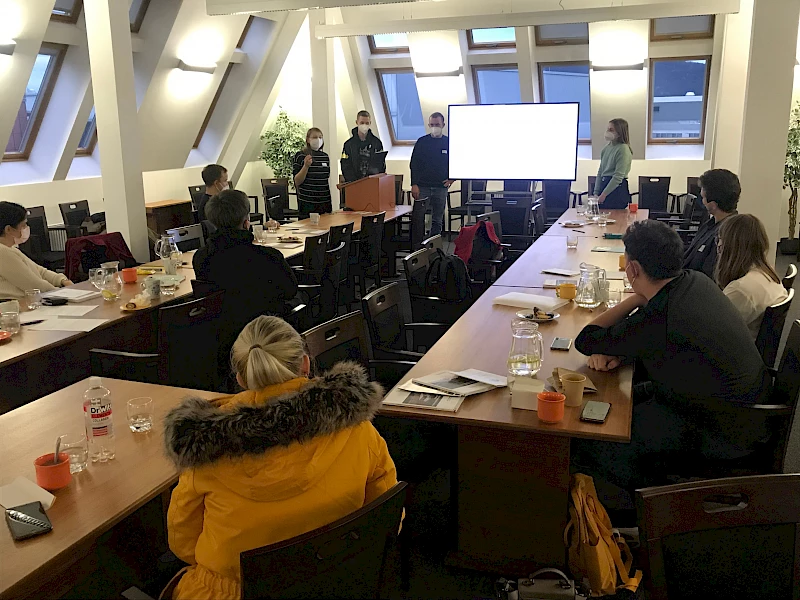
11:00 break
11:30 Create a moral courage workshop, then working groups 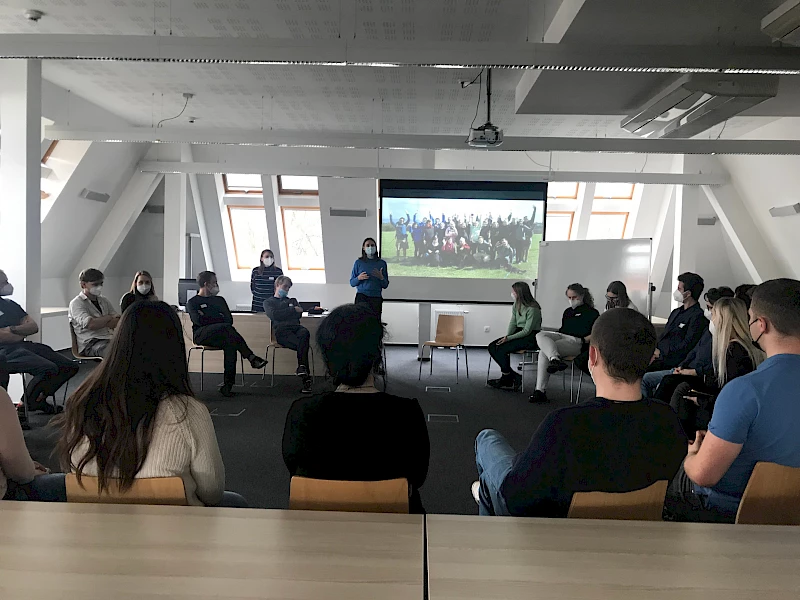
13:00 lunch break
14:00 Continuation of the working groups and presentation of the results
16:30 Visit to the exhibition "Our Germans", Museum Ústí nad Labem 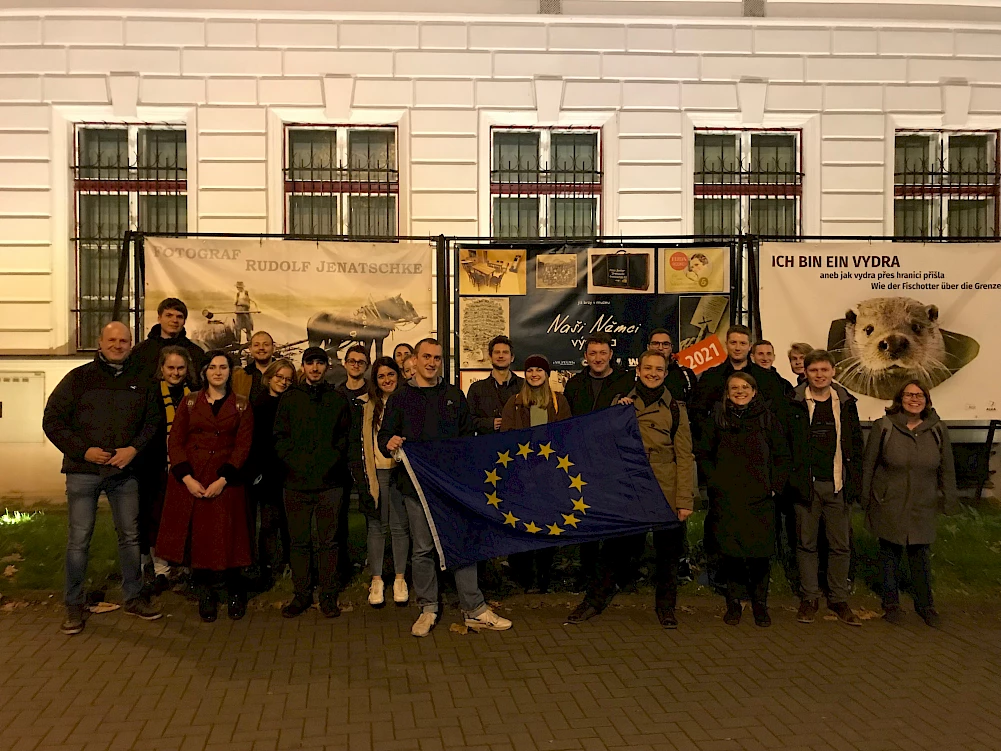
Final conference
A jak jsou na tom česko-německé vztahy v pohraničí? Yes muůžeme ještě lépe spolupracovat v oblasti vzdělávání, yes muůžeme podporovat občanskou odvahu ve školách? Těmito otázkami se zabývala závěrečná konference projektu CouReg, která se konala 13. května 2022 na univerzitě v Ústí nad Labem. Vladimír Lipský, zástupce Euroregionu, a Lukáš Novotný (UJEP) přivítali četné hosty - studenty, akademiky i praktiky zabývající se demokracií.
Patrick Reitinger, historical geographer of the Otto-Friedrichovy university in Bamberku, zahájil věcnou část konference přednáškou o německo-českých vztazích. Představil důležité historické milníky, jako je vznik první Československé republiky, druhá světová válka nebo konec studené války, a jejich význam pro současnost. Pro demokracie na obou stranách hranice byla podle Reitingera klíčová především jedna věc: spor. Pouze při výměně názorů a diskusi můžeme také získat pochopení per různé perspective, které často vznikly na základě různých historických zkušeností. A jen když spolu budeme mluvit, zajímat se o sebe navzájem, jen tehdy vyroste silná občanská společnost.
© SG
Reitinger zdůraznil, že formálně až do konce studené války, ale prakticky i po ní, nemáme jednu německou perspektivu, ale dvě. Poté se zaměřil především na západoněmeckou perspektivu, concrete on bavorsko-české vztahy od roku 1918. Se vznikem první Československé republiky vyvstala v pohraničí otázka národnostní příslušnosti. Mnichovská dohoda z roku 1938 vedla k vyhnání československého obyvatelstva ze Sudet, které musela první Československá republika postoupit Německé říši. Druhá světová válka byla poznamenána vyháněním a nacistickými zvěrstvy. Rozdělení na národnosti však bylo podle Reitingera absurdní. Proti sobě nestáli "Němci" proti "Čechům", ale jejich příznivci a odbojáři. Poválečné období bylo poznamenáno Benešovými dekrety, které stanovily odsun Němců z Československa a jejich vyvlastnění.
Období studené války bylo dobou systémové hranice: na jedné straně Bavorsko, na druhé Československo a Sasko. To má vliv i dnes. S concem sovětského svazu a mírovým rozpadem Československa na dva státy v Roce 1992 Začala Nová Éra, která vyvrcholila Česko-německou declarací z roku 1997 A vstupem České republiky do eu v roclily sowi meznym. Vztahy s Bavorskem však zůstaly napjaté. Teprve v roce 2010 bavorský premier oficiálně navštívil Prahu.
© SG
Podle Reitingera je je each věc jasná: potřebujeme společný pohled na budoucnost, který by zohledňoval různé perspective. Mírové soužití v německo-českém pohraničí tak může sloužit jako vzor i per další pohraniční regiony postižené kampfy.
Právě na tuto spolupráci se zaměřil následující slot. Panelová discuse, kterou moderovala Cathleen Bochmann z Aktion Bürgercourage eV, they zabývala různými aspecty přeshraniční spolupráce, zejména spoluprací ve školství. Na pódiu seděli odborníci z různých oblastí: Markéta Meissnerová, generální konzulka České republiky v Drážďanech, Vladimír Handl, odborný asistent Ústavu mezinárodních vztahů Univerzity Karlovy v Praze, který se ve své práci věnuje zejména česko-německým vztahům, dále Rüdiger Kubsch z Euroregionu Labe v Drážďanech a studentka Bianca Brendel z Česko-německého fora mládeže.
© SG
Brzy se ukázalo, že na otázku, jak dobré vztahy vlastně jsou, není tak snadné odpovědět. Meissnerová a Brendel viděli dobrou, výraznou spolupráci, zejména na pozadí Pandemie Corona, i když se podle Brendela mnoho aktivit v rámci spolupráce obecně zaměřovalo na příhraniční oblast. Na druhé straně Kubsch uvedl vztahy na pravou míru: Pouze asi 10 percent Němců má nějaký vztah k České republice av Německu se tomu téměř nevěnuje pozornost médií. Zejména v každodenním životě lidí je přeshraniční spolupráce malým procesem, který často ztěžují jazykové bariéry. Podle pražského badatele Handla je třeba rozlišovat různé úrovně: pragmatická, decentralizovaná, depolitizovaná spolupráce je již velmi dobrá. Politicky však není příliš konzistentní a často je příliš ovlivněna národními zájmy.
Translated with www.DeepL.com/Translator (free version)
Field trip "Face to face" instead of "back to back"
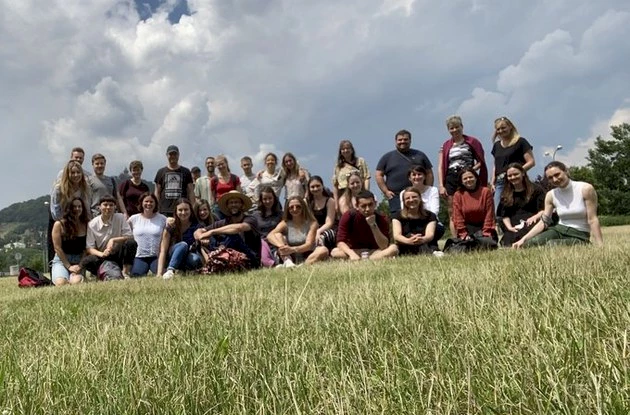 S Tímto Mottem JSME ODJELI DO Německočeského Přího Regionu Dne 26. Června 2021. Studeni University Evangelisty Purkyně v ústí nad Labem a Technické University v Drážďanech společnají příhrani region a zamysleli Se o zpsobsleli Se o zpsobsleli Se o zpsobslel.
S Tímto Mottem JSME ODJELI DO Německočeského Přího Regionu Dne 26. Června 2021. Studeni University Evangelisty Purkyně v ústí nad Labem a Technické University v Drážďanech společnají příhrani region a zamysleli Se o zpsobsleli Se o zpsobsleli Se o zpsobslel.
Plan
- Zámek Jezeří: povrchová těžba hnědého uhlí jako hrozba per kulturní statky, současné protesty proti ničení životního prostředí těžbou, odlesňování , rozhovor s aktivisty
- Kostel Nanebevzetí Panny Most: Komunistické planování nového mesta, přemístění starého kostela
- Cvičení pro účastníky: objevte Most
- Chanov, návštěva čtvrti, rozhovor s aktivisty a zástupci komunity
- Společná večeře v restauraci "Severka", v kultovním baru televizního seriálu Most!, který se věnuje problem severních Čech.
- Kaple Kaple Sinutec: občanská angažovanost, zničené a zaniklé vesnice
Školni projekty
With students from the UJEP Ustí nad Labem and the TU Dresden, we deal with the topic of civil courage and social commitment. An important focus is on training civil courageous action. In both Germany and the Czech Republic, we practice with schoolchildren how to behave in violent situations. The spectrum ranges from physical arguments in the schoolyard, to exclusion, to social imbalances such as discrimination against different groups. Moral courage is always required when a person or a group experiences violence. This can be physical, psychological, but also structural.
Intervention in such situations is important, but people often do not dare to do so, are afraid of embarrassing themselves or of being harmed themselves. But that need not be. Civil courage can be practiced. Everyone has the power to stand by people and, for example, to inform the police or to address other viewers to intervene. Together with the students, we train how to act in such situations. The materials will then be published in Czech and German and made available to teachers on both sides of the border.

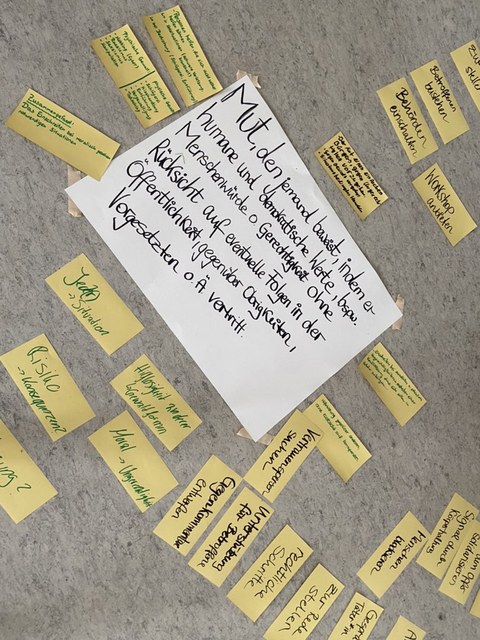 © C. Bochmann
© C. Bochmann